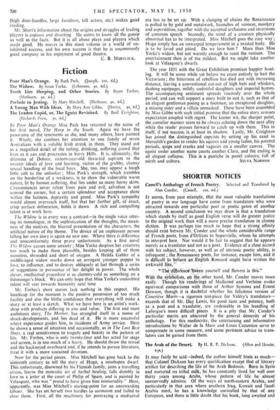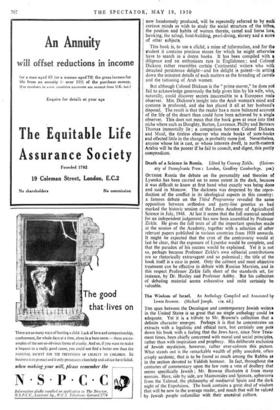IT May fairly be said—indeed, the author himself hints as
much— that Colonel Dickson has every qualification except that of literary artifice for describing the life of the Arab Bedouin. Born in Syria and nurtured on tribal milk, he has constantly lived for well over thirty years among Arabs, ' whose pattern of life he' almost unreservedly admires. Of the ways of north-eastern Arabia, and particularly in that area where southern Iraq, Kuwait and Saudi Arabia meet, he has a knowledge unrivalled by that of any European, and there is little doubt that his book,.long awaited and now handsomely produced, will be repeatedly referred to by such curious minds as wish to study the social structure of the tribes, the position and habits of women therein, camel and horse lore, hawking, the saluqi, boat-building, pearl-diving, slavery and a score of other subjects.
This book is, to use a clichd, a mine of information, and for the student it contains precious stones for which he might otherwise have to search in a dozen books. It has been compiled with diligence and an enthusiasm rare in Englishmen ; and Colonel Dickson rather resembles certain Continental writers who with detached persistence delight—and his delight is patent—in settini down the minutest details of such matters as the branding of camels and the tattooing of Arab women.
But although Colonel Dickson is the " prime mover," he does not fail to acknowledge generously the help given him by his wife, who, naturally, could discover secrets inaccessible to a European male observer. Mrs. Dickson's insight into the Arab woman's mind and customs is profound, and she has placed it all at her husband's disposal. The result is that the reader has a more balanced account of the life of the desert than could have been achieved by a single observer. This does not mean that the book goes at once into that niche where such as Doughty, Burton, Lawrence, Philby and Bertram Thomas immortally lie ; a comparison between Colonel Dickson and Musil, the tireless observer who made books of note-books and effected little in the change, is probably more just. Nevertheless, anyone whose lot is cast, or whose interests dwell, in north-eastern Arabia will be the poorer if he fail to consult, and digest, this portly compendium.











































 Previous page
Previous page